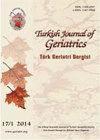70岁高龄女性乳腺癌的预后因素及生存率
IF 0.3
4区 医学
Q4 GERIATRICS & GERONTOLOGY
Turkish Journal of Geriatrics-Turk Geriatri Dergisi
Pub Date : 2020-01-06
DOI:10.31086/TJGERI.2020.121
引用次数: 0
摘要
426 YETMİŞ YAŞ VE ÜZERİ MEME KANSERLİ YAŞLI KADINLARDA PROGNOSTİK FAKTÖRLER VE SAĞKALIM简介:在老年乳腺癌患者的治疗中,每位患者应根据其具体的疾病、表现状态、生物学年龄进行治疗。在这项研究中,我们旨在探讨影响≥70岁及以上乳腺癌妇女生存的预后因素。材料与方法:对2011 - 2017年在伊斯坦布尔卫生科学大学培训与研究医院放射肿瘤学门诊就诊的年龄≥70岁的女性患者148例进行评价。结果:年龄(p<0.001)、肿瘤直径(p<0.001)、可操作性(p<0.001)、肿瘤分期(p<0.001)、左旋血管侵犯(p=0.045)、雌激素受体阳性(p=0.002)、孕激素受体阳性(p=0.046)、转移(p<0.001)、Ki 67≥14比(p=0.035)、Charlson合病指数(p=0.005)、放疗适用性(p=0.023)与总生存率有显著相关性。多因素cox回归分析显示,年龄(HR=1.126, 95% CI=1.048 ~ 1.210, p<0.001)、雌激素受体阳性(HR=3.701, 95% CI=1.286 ~ 0.652, p=0.015)、有无转移(HR=0.210, 95% CI=0.051 ~ 0.863, p=0.030)是独立的预后因素。结论:根据我们的临床经验,健康老年女性新近确诊乳腺癌的治疗方法与年轻女性相似,即手术、腋窝评估、放疗、全身辅助治疗(视肿瘤性质及复发风险而定)。在老年乳腺癌患者中,ER阳性、无远处转移、年龄小于< 79岁已被确定为影响生存率的独立预后因素。本文章由计算机程序翻译,如有差异,请以英文原文为准。
PROGNOSTIC FACTORS AND SURVIVAL OF ELDERLY WOMEN WITH BREAST CANCER AGED ?70 YEARS
426 YETMİŞ YAŞ VE ÜZERİ MEME KANSERLİ YAŞLI KADINLARDA PROGNOSTİK FAKTÖRLER VE SAĞKALIM Introduction: In the treatment of geriatric patients with breast cancer, each patient should be treated according to his/her specific disease, performance status, and biological age. In this study, we aimed to investigate prognostic factors affecting survival in women aged ≥70 years of age and older with breast cancer. Materials and Method: A total of 148 female patients aged ≥70 years who were admitted to the University of Health Sciences Istanbul Training and Research Hospital Radiation Oncology clinic between 2011 and 2017 were evaluated. Results: Age (p<0.001), tumor diameter (p<0.001), operability (p<0.001), tumor stage (p<0.001), lenfovascular invasion (p=0.045), estrogene receptor positivity (p=0.002), progesterone receptor positivity (p=0.046), metastasis (p<0.001), Ki 67 ≥ 14 ratio (p=0.035), Charlson comorbidity index (p=0.005), and radiotherapy applicability (p=0.023) were significantly associated with overall survival. Multivariate cox regression analysis revealed that age (HR=1.126, 95% CI=1.048–1.210, p<0.001), estrogene receptor positivity (HR=3.701, 95% CI=1.286–0.652, p=0.015), and presence of metastasis (HR=0.210, 95% CI=0.051-0.863, p=0.030) were independent prognostic factors. Conclusion: According to our clinical experiences, the treatment approach for healthy elderly women with recently diagnosed breast cancer is similar to that for young women, i.e., surgery, axillary evaluation, radiotherapy, and systemic adjuvant therapy (depending on tumor properties and recurrence risk). In elderly breast cancer patients, ER positivity, absence of distant metastasis, and age younger than < 79 years old have been identified as independent prognostic factors that positively affect survival.
求助全文
通过发布文献求助,成功后即可免费获取论文全文。
去求助
来源期刊

Turkish Journal of Geriatrics-Turk Geriatri Dergisi
GERIATRICS & GERONTOLOGY-
CiteScore
0.60
自引率
0.00%
发文量
46
审稿时长
6-12 weeks
期刊介绍:
Turkish Journal of Geriatrics is a peer-reviewed journal. Official language of the journal is English. Turkish Journal of Geriatrics invites submission of Original Articles based on clinical and laboratory studies. Review Articles are published only after the invitation from the Editorial Board.
 求助内容:
求助内容: 应助结果提醒方式:
应助结果提醒方式:


